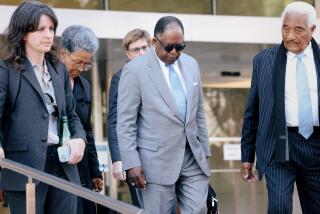Trying Times Drag On for Rubino Family
- Share via
SANTA ANA — Moments after the judge declared a mistrial, 19-year-old Michele Rubino cringed in the empty courtroom, hiding from the world.
She couldn’t face that mob of lawyers, jurors and reporters. She couldn’t face her crestfallen father. She couldn’t face everything that lay beyond those courtroom doors, especially the months of money worries and emotional strain that almost certainly await her family.
“I don’t really know what we’re going to do now,” she said, folding and unfolding a tissue with trembling fingers.
Though jurors didn’t convict Ronald S. Rubino of criminal misconduct in the Orange County bankruptcy, they did postpone any resolution of the nightmare in which his family is embroiled.
Rubino appeared resigned when the judge declared a hung jury, and calm when discussing what comes next. But each time he caught sight of his anguished family, particularly his eldest daughter, tears welled in his eyes.
Included in the collateral pain that Orange County’s bankruptcy continues to cause, a tight-knit family now finds itself in an even tighter spot.
Over the last 10 months, while facing prison for his actions as budget director, the 44-year-old Rubino has leaned heavily on his wife of nine years, 53-year-old Sharon Esterley, and his two daughters from a previous marriage, Michele and 16-year-old Alison.
In response, the family has spun a web of support that gets stronger each time it’s stretched--and larger by the day.
With each new twist in the complex case, Esterley drafts a quasi-newsletter, drawing on her skills as public relations expert and former spokeswoman for John Wayne Airport.
Michele then stuffs copies of the newsletter into envelopes, which a volunteer mails off to friends and supporters across the nation, a group now numbering in the hundreds.
Other family friends pitch in with photocopying, transcribing and filing, and many have written heartfelt letters to the Orange County supervisors, urging them to pay Rubino’s legal bills.
Ultimately, the supervisors set aside $500,000 for Rubino’s defense.
“I know a lot of my parents’ friends really well,” says Michele, chuckling through her tears. “It’s sick! I spend more time with them than with my own friends.”
Friday, with the words “hung jury” still hanging in the air, the Rubino-Esterley clan (who sometimes call themselves “Ester-binos”) sprang into action, showing the teamwork and moxie that make them a force.
As jurors headed dejectedly for the doors, Michele and Esterley were there, waiting, arms outstretched. Tearfully, the two women said thank you and goodbye as though taking leave of close relatives after a long and difficult visit.
(When reporters noticed the strange reception line at the courtroom exit, Esterley warned them with mock seriousness: “Don’t you dare write that I was crying.”)
Next, as jurors reached the hall, close friends of the Rubino family cornered them and conducted impromptu interviews, even collecting home phone numbers for future use. Under her breath Esterley whispered: “We might add them to our mailing list.”
Finally, as the last juror left, Esterley turned to her corps of volunteers and began issuing new orders.
“Call my sister Sheryl!” she commanded. “Call her collect. Then call everyone on the list. Except yourselves.”
“No one should have to go through this,” Rubino said with a mixture of pride and fatigue. “But it’s a lot better if you have someone like Sharon.”
Rubino and Esterley met at a retreat sponsored by Southern California Edison, when she was working for Orangewood Children’s Home and he was with the General Services Agency. At first, she thought he was married, because he immediately bragged about his two children.
But realizing he was divorced, she grew intrigued, and their mutual attraction flourished over countless games of Trivial Pursuit.
Like her father, Michele lauded her stepmother for an aggressive style that gets things done. But in the empty courtroom, she wondered if Esterley will be able to handle everything herself. Due to depart today for UC Santa Barbara, where she’s a sophomore majoring in communications, Michele worried aloud that she’s leaving Esterley and her father in the lurch.
“They can’t go through all this alone,” she said, sniffling. “I feel guilty leaving for school.”
Throughout her father’s six-week trial, Michele rarely left his side. She was ever-present on the sixth floor of the Orange County Courthouse, when she wasn’t dashing to the cafeteria to get someone a cup of coffee, or dispensing oversized oatmeal cookies, or running downstairs to feed the parking meters.
Sometimes, she would sit quietly with her stepmother, deconstructing the smallest gestures and facial tics of a particular juror.
Many openly admired Michele’s unofficial role on the defense team, including some who decided the case. When court was dismissed, one of the younger jurors embraced Michele like a long-lost sorority sister, then wished her luck.
“Whenever I saw you in the courtroom,” said the juror, Lisa Barnes, “it would calm me.”
Bailiffs became so fond of Michele that one inquired, paternally, about a small gash in her foot. Finally, when she meekly requested a few minutes in the abandoned courtroom, while her stepmother worked the crowd and her father conducted interviews, a bailiff told her to take all the time she needed, then locked the doors and covered the windows to give her more privacy.
Joane Duong, a friend since seventh grade, said Michele may be the invisible glue that holds her family together. Around the house, Michele “does everything,” from grocery shopping to dog-grooming to deposition transcription.
“This whole summer she’s been filing stuff, helping out so much,” Duong says. “This wasn’t even a summer for her. She never did anything fun.”
After collecting her thoughts and crying herself dry, Michele decided she was ready to face the murmuring throngs on the other side of the door. She took a deep breath and stepped into the hall.
From afar, she watched her stepmother continue to debrief sympathetic jurors, while her father comforted friends, who seemed more devastated than he. Sometimes, she said, her father likes to tease.
“He always says things like, ‘You sure you don’t want to disown me?’ And I say, ‘Shut up. Don’t even kid like that.’ ”
She watches him talk to yet another TV camera and her eyes fill again with tears.
“I mean, God, it’s my dad,” she says. “I don’t know why I think he’s so fragile. I mean, I know he’s strong, but I just expect him to crumble.
“I know in the end this will make our family stronger,” Michele said. “But it’s a terrible thing to go through right now.”
(BEGIN TEXT OF INFOBOX / INFOGRAPHIC)
People vs. Ronald S. Rubino
Here is the crux of each side’s argument in the case of former county Budget Director Ronald S. Rubino, which ended in mistrial:
Prosecutors said: Rubino helped former Treasurer Robert L. Citron divert nearly $100 million in interest earnings intended for cities, school districts and other government agencies. Rubino set up an “Economic Uncertainty Fund” for the extra interest, and knew of the illegal diversion.
Defense said: Rubino set up the rainy-day fund, but had no idea it was being filled with illegally diverted proceeds. Rubino never questioned where the extra funds were coming from, even after the treasurer reported a 400% increase in the county’s 1993 investment pool earnings.
What’s next: Following the mistrial, prosecutors said they will retry Rubino. Judge J. Stephen Czuleger set a new trial date of Oct. 8.
More to Read
Sign up for Essential California
The most important California stories and recommendations in your inbox every morning.
You may occasionally receive promotional content from the Los Angeles Times.












